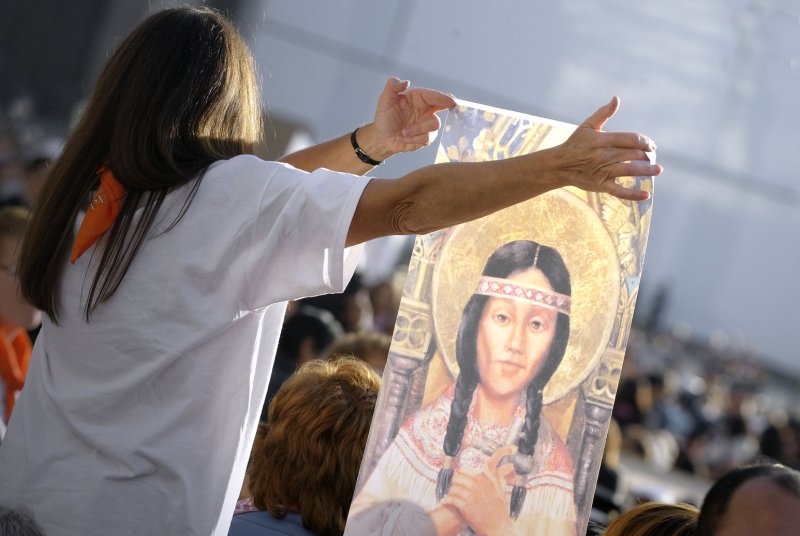Lifestyle
Kateri Tekakwitha Canonized as First Native American Saint

On October 21, 2012, Pope Benedict XVI canonized Kateri Tekakwitha, making her the first Native American saint in the Roman Catholic Church. This significant event marked a historic moment for Indigenous communities, as Tekakwitha, who lived in the 17th century, became a symbol of faith and resilience.
Historical Context of Kateri Tekakwitha
Kateri Tekakwitha was born in 1656 in what is now New York State, to a Mohawk chief and a Christian mother. After losing her family to smallpox, she was raised by her maternal uncle, who opposed her Christian beliefs. Despite the challenges she faced, Kateri remained devoted to her faith and was baptized at the age of 20. She spent her later years in a Jesuit mission in Canada, where she became known for her piety and dedication to helping others.
The canonization process for Kateri Tekakwitha began in the 18th century, but it gained momentum in the 20th century as her story resonated with many. In 1980, she was beatified by Pope John Paul II, a step that recognized her as having lived a life of heroic virtue.
Significant Events on October 21
The canonization of Kateri Tekakwitha is just one of many notable events that have occurred on October 21 throughout history. In 1805, the British fleet under Admiral Horatio Nelson achieved a decisive victory at the Battle of Trafalgar, defeating the combined French and Spanish fleets. This battle was pivotal in establishing British naval dominance.
On this day in 1879, inventor Thomas Edison developed the first practical electric incandescent lamp after 14 months of experimentation, paving the way for widespread electric lighting. The implications of this invention transformed daily life and industry.
In 1948, Western Allies lifted their condemnation of Russia, linking it to the resolution of the Berlin Blockade, in an effort to stabilize post-war Europe. This decision came during a tense period when the Cold War was beginning to take shape.
More recent historical events include the 2004 sentencing of Staff Sgt. Ivan “Chip” Frederick, who was implicated in the Abu Ghraib prison scandal. Frederick received an eight-year prison sentence for his involvement in the abuses, which sparked international outrage.
In 2011, U.S. President Barack Obama announced the withdrawal of American troops from Iraq, signaling the end of nearly nine years of military involvement in the region. “After nearly nine years,” Obama stated, “America’s war in Iraq will be over.”
These events illustrate how October 21 has been a day of profound historical significance across various spheres, including religion, military history, innovation, and politics. The canonization of Kateri Tekakwitha adds a powerful narrative of faith and cultural heritage to this rich historical tapestry.
-

 Science1 week ago
Science1 week agoResearchers Challenge 200-Year-Old Physics Principle with Atomic Engines
-

 Politics1 week ago
Politics1 week agoNHP Foundation Secures Land for 158 Affordable Apartments in Denver
-

 Health1 week ago
Health1 week agoNeuroscientist Advocates for Flag Football Until Age 14
-

 Lifestyle1 week ago
Lifestyle1 week agoLongtime Friends Face Heartbreak After Loss and Isolation
-

 Health1 week ago
Health1 week agoFDA Launches Fast-Track Review for Nine Innovative Therapies
-

 Top Stories1 week ago
Top Stories1 week agoUnforgettable Moments: The Best Victoria’s Secret Performances
-

 Politics1 week ago
Politics1 week agoIsraeli Air Strikes in Lebanon Kill One, Wound Seven Amid Tensions
-

 World1 week ago
World1 week agoTroops to Enjoy Buffalo Chicken, Thai Curry in 2026 MREs
-

 Business1 week ago
Business1 week agoMaine Housing Inventory Surges to Post-Pandemic High
-

 World1 week ago
World1 week agoGlobal Military Spending: Air Forces Ranked by Budget and Capability
-

 Politics1 week ago
Politics1 week agoMassachusetts Lawmakers Resist Audit After Voter Mandate
-

 Business1 week ago
Business1 week agoSpirit Airlines Cuts Workforce with Furloughs for 365 Pilots









